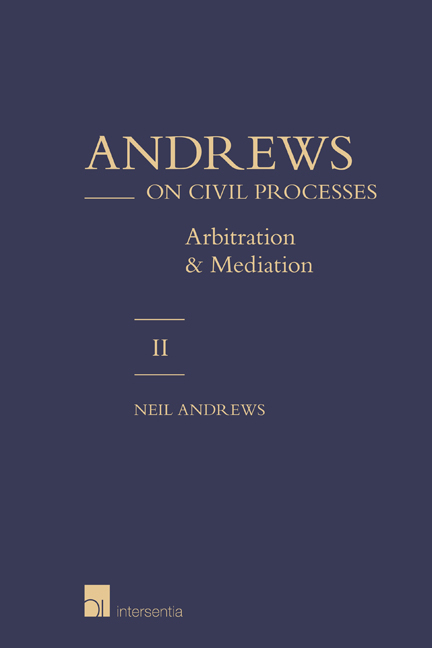Chapter 2 - Mediation Combined with Arbitration
from PART I - MEDIATION
Published online by Cambridge University Press: 13 December 2017
Summary
INTRODUCTION
This chapter is devoted to connections between mediation and arbitration. The main points of contact are as follows.
(i) Multi-tier dispute resolution clauses render mediation an obligatory step prior to arbitration or litigation; in England it is possible for the innocent party to seek a stay of premature litigation to create the opportunity for mediation to be pursued, if the opponent, in breach of such a multi-tier dispute resolution clause, has wrongly commenced litigation before conducting mediation (1.59 ff); the leading English decision is Cable & Wireless case (2002).
(ii) Occasionally the English court might recommend mediation to try to resolve an impasse; this can arise when the parties have litigated in different jurisdictions in order to determine whether they should be arbitrating; this was Colman J's response to a jurisdictional wrangle concerning a disputed arbitration agreement in C v. RHL (2005) (2.07).
(iii) Mediation might be voluntarily attempted by the parties even aft er arbitration has begun (2.08).
(iv) Parties might clothe an arbitrator as a mediator (‘med-arb’, that is, ‘intraarbitral mediation’); here the arbitrator is required, if necessary, to perform the successive roles of mediator and arbitrator; but this ‘chameleon’ style of dispute resolution is controversial; nevertheless, there has been commercial interest in expansion of this consensual method of ‘med-arb’ (2.09 ff). The problems here are:
(a) there are doubts whether an arbitrator will be necessarily competent to act in both capacities;
(b) the prospect of arbitration might impede the parties’ in the conduct of mediation because they might be inhibited from weakening their prospects during arbitration, if the mediation fails;
(c) there are also dangers of confidential information imparted during the mediation phase being improperly used by the arbitrator during the second phase;
(d) the mediator might have a financial conflict of interest because greater remuneration might arise if the dispute proceeds to arbitration;
(e) a mediated settlement achieved through the intervention of an arbitrator is not obviously an ‘arbitral award’ (and the better view is that it is not such an award); problems of enforcement can arise, therefore, if an attempt is made to enforce the settlement using the machinery of enforcement applicable to arbitral awards.
- Type
- Chapter
- Information
- Andrews on Civil ProcessesArbitration and Mediation, pp. 65 - 82Publisher: IntersentiaPrint publication year: 2013
- 1
- Cited by



